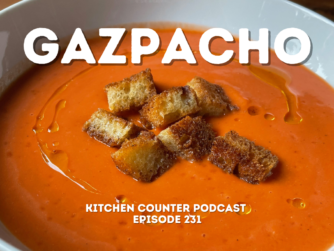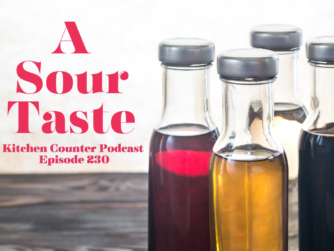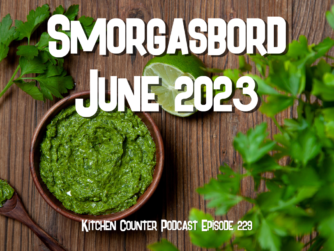Download the episode MP3 (right click to save)
Better Burgers
Disclaimer: Hamburgers can be hugely personal to many people. If anything I’m about to say runs contrary to any of your tried and true methods or favorite ways to cook burgers–hey, don’t listen to me and keep on doing what you love! This isn’t about telling you that you are doing it wrong (well, not all of it anyway), but I hope if you are looking to take your burger game up a step, this will help.
What are the keys to a better burger?
What kind of fat percentage should your ground beef have?
80/20 is a good middle ground. Any leaner and your burgers will get dry. Any more fatty and your burgers will be, well, fatty.
If you have the luxury of grinding your own burger you can pick up some chuck and grind it yourself. You could also have your local butcher or grocery store grind it for you. Otherwise, don’t feel bad about buying the pre-ground stuff at the supermarket.
Do you add binding ingredients to the mix (eggs, breadcrumbs, etc)?
This might be controversial to some, but in my opinion you should not be putting any extra stuff into your burger mix. Some people put eggs or bredcrumbs for binding, some people like to put onions or peppers. Some people even like to mix the cheese into the body of the burger. There are a couple of reasons I think this is not a great idea. First of all, everything you put into the mix takes away from the flavor of the beef, which is the main part of your burger. Second, some stuff you put into your burger can really change the texture and make it more “meatbally” than “burgery.” And finally, and probably most important, adding ingredients to the mix means you have to work the mix a lot more to incorporate the fillers, which leads me to my third point for brilliant burgers:
Don’t overwork the beef (you aren’t kneading dough).
Every time you push, pull, mix, spread, squeeze, or manipulate that ground beef, your are changing the fundamental properties of that burger. The more you mess with it, the more you compress the meat into a more dense, less juicy version of its former self. Remember how I mentioned “meatbally” in the previous section? That’s what you’ll get with an overworked mixture, and at its worst, you can get something that closely resembles corrugated cardboard in texture. Less is definitely more when it comes to messing with your burger mix. Form your patties as gently as possible, and try to make them about 20% bigger than you want your finished patty to be, as there will be some shrinkage (mostly depending on fat content and to what temp you cook the burgers).
Now let’s talk about seasoning: Season liberally with salt and pepper, but don’t salt until the burger patties are formed. Never, ever toss salt into the ground beef mixture before you form it into patties. Why? It starts to break down the proteins in the beef and makes it more easily stick together. In other words, it gets kind of dense and gummy. If you need proof, take a look at this post here:
http://aht.seriouseats.com/archives/2009/12/the-burger-lab-salting-ground-beef.html. Just count on putting a bunch of coarse salt and pepper on your burger right before grilling.
Griddle or Grill?
The answer? Yes. Both methods can deliver the perfect burger, though I know many people prefer one method over the other. Here are a couple of things to keep in mind depending on which method you decide to use:
Grill: Grilled burgers will be inherently less juicy, primarily because when any juice runs out of the burger during cooking, it will fall helplessly down through the grill grates, so you’ll want to use a mix with a little more fat. Also note that you will get those nice grill marks on your burger, but you won’t get the all-over crust you can achieve by griddling your burger. The big upsides to grilling are that for one, it’s a lot of fun and festive especially when you have guests over. Second, you can get an awesome smoky flavor that you just can’t get on a griddle.
Griddle: “Griddling” (or flat-top, or frying) your burger is my favorite method. You’re going to get a juicier burger because the patty kind of cooks in its own juices. You can also get an awesome crust on the patty when you cook it in a screaming-hot pan or griddle. Drawbacks? Your burgers might be a little greasier, and you won’t get that smoky grill flavor, especially when grilling over charcoal.
The Burger Lab from Serious Eats
Connect with The Kitchen Counter Podcast!
Facebook: https://www.facebook.com/kitchencounterpodcast
Twitter: @TKCpodcast
Email:
fe******@ki*******************.com
If you liked what you heard, please consider subscribing in iTunes. You can also help out the show by leaving a positive review in the iTunes store (you know you want to)!




Exactly the info I wanted. Great podcast.